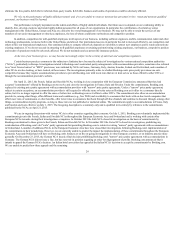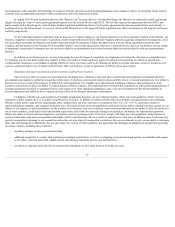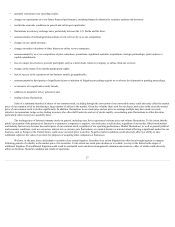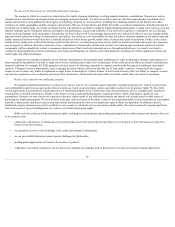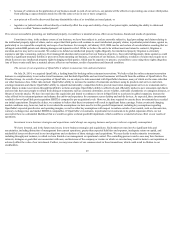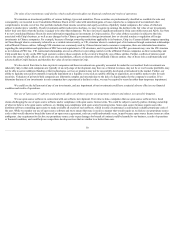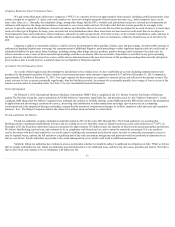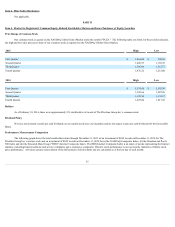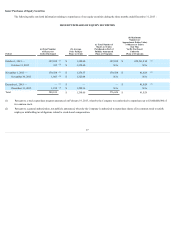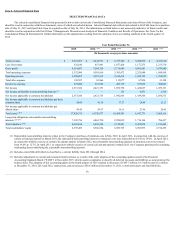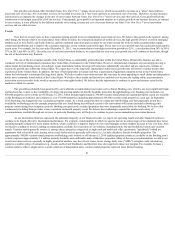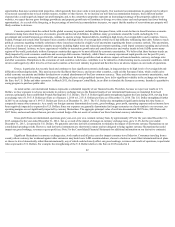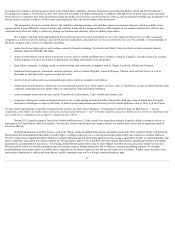Priceline 2015 Annual Report Download - page 36
Download and view the complete annual report
Please find page 36 of the 2015 Priceline annual report below. You can navigate through the pages in the report by either clicking on the pages listed below, or by using the keyword search tool below to find specific information within the annual report.
Litigation Related to Travel Transaction Taxes
We and certain third-party online travel companies ("OTCs") are currently involved in approximately forty lawsuits, including certified and putative class
actions, brought by or against U.S. states, cities and counties over issues involving the payment of travel transaction taxes (e.g., hotel occupancy taxes, excise
taxes, sales taxes, etc.). Generally, the complaints allege, among other things, that the OTCs violated each jurisdiction's respective relevant travel transaction tax
ordinance with respect to the charge and remittance of amounts to cover taxes under each law. We believe that the laws at issue generally do not apply to the
services we provide, namely the facilitation of travel reservations, and, therefore, that we do not owe the taxes that are claimed to be owed. However, we have been
involved in this type of litigation for many years, and state and local jurisdictions where these issues have not been resolved could assert that we are subject to
travel transaction taxes and could seek to collect such taxes, retroactively and/or prospectively. From time to time, we have found it expedient to settle, and may in
the future agree to settle, claims pending in these matters without conceding that the claims at issue are meritorious or that the claimed taxes are in fact due to be
paid.
Litigation is subject to uncertainty and there could be adverse developments in these pending or future cases and proceedings. An unfavorable outcome or
settlement of pending litigation may encourage the commencement of additional litigation, audit proceedings or other regulatory inquiries and also could result in
substantial liabilities for past and/or future bookings, including, among other things, interest, penalties, punitive damages and/or attorneys' fees and costs. An
adverse outcome in one or more of these unresolved proceedings could have an adverse effect on our results of operations or cash flow in any given operating
period. However, we believe that even if we were to suffer adverse determinations in the near term in more of the pending proceedings than currently anticipated,
given results to date it would not have a material impact on our liquidity or financial condition.
Accrual for Travel Transaction Taxes
As a result of this litigation and other attempts by jurisdictions to levy similar taxes, we have established an accrual (including estimated interest and
penalties) for the potential resolution of issues related to travel transaction taxes in the amount of approximately $27 million at December 31, 2015 compared to
approximately $52 million at December 31, 2014 . Our legal expenses for these matters are expensed as incurred and are not reflected in the amount accrued. The
actual cost may be less or greater, potentially significantly, than the liabilities recorded. An estimate for a reasonably possible loss or range of loss in excess of the
amount accrued cannot be reasonably made. See Note 15 to our Consolidated Financial Statements.
Patent Infringement
On February 9, 2015, International Business Machines Corporation ("IBM") filed a complaint in the U.S. District Court for the District of Delaware
against The Priceline Group Inc. and its subsidiaries KAYAK Software Corporation, OpenTable, Inc. and priceline.com LLC (the "Subject Companies"). In the
complaint, IBM alleges that the Subject Companies have infringed and continue to willfully infringe certain IBM patents that IBM claims relate to the presentation
of applications and advertising in an interactive service, preserving state information in online transactions and single sign-on processes in a computing
environment and seeks unspecified damages (including a request that the amount of compensatory damages be trebled), injunctive relief and costs and reasonable
attorneys’ fees. The Subject Companies believe the claims to be without merit and intend to contest them.
French and Italian Tax Matters
French tax authorities recently concluded an audit that started in 2013 of the years 2003 through 2012. The French authorities are asserting that
Booking.com has a permanent establishment in France and are seeking to recover what they claim are unpaid income taxes and value-added taxes ("VAT"). In
December 2015, the French tax authorities issued an assessment for approximately 356 million Euros, the majority of which would represent penalties and interest.
We believe that Booking.com has been, and continues to be, in compliance with French tax law, and we intend to contest the assessment. If we are unable to
resolve the matter with the French authorities, we would expect to challenge the assessment in the French courts. In order to contest the assessment in court, we
may be required to pay, upfront, the full amount or a significant part of any such assessment, though any such payment would not constitute an admission by us
that we owe the tax. French authorities may decide to also audit subsequent tax years, which could result in additional assessments.
Similarly, Italian tax authorities have initiated a process to determine whether we should be subject to additional tax obligations in Italy. While we believe
that we comply with Italian tax law, Italian tax authorities may determine that we owe additional taxes, and they may also assess penalties and interest. We believe
that we have been, and continue to be, in compliance with Italian tax law.
33



